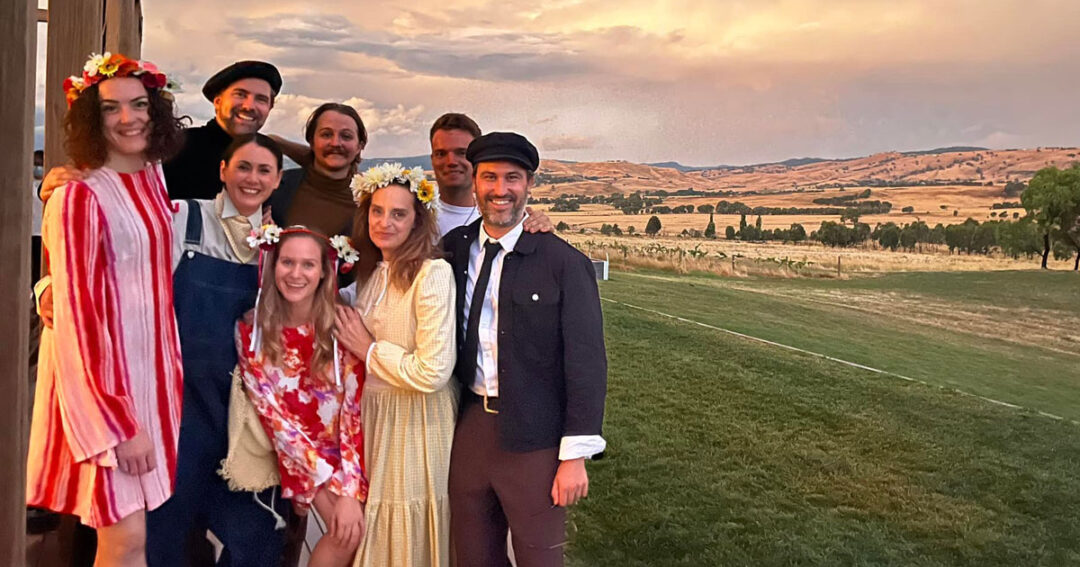You are full of pretty answers, Essential Theatre!
With our society stretched and broken, Essential Theatre has managed to breathe, light, and colour, and laughter into our world through its 20th anniversary Shakespeare In The Vines tour of As You Like It.
Indeed, with indoor theatres diminished by capacity ceilings, this outdoor touring project has been able to thrive by literally embracing Shakespeare’s observation that all the world’s a stage.
And as we saw at Sevenhill Cellars in Clare Valley last night, all the men and women in this cast were “merely” and magnificently players in true Shakespearean spirit.
From the opening moment, the Bard’s sharp and cheeky text leapt from the page and was majestically embodied before (and amid) a vineyard lawn populated with adoring theatre fans.
This archetypal Rom Com was played with high energy and plenty of winks to the audience; it was as if the cast was wooing the audience while the characters wooed each other.
And while this review has begun in a manner as gushing as Orlando’s poems about Rosalind, let’s step back and look at four reasons why the audience “liked it” very much indeed.
Firstly, the storyline is an artfully-contrived romp, distilled perfectly in the programme, thus: Rosalind (Freya Pragt) has had a big day. She’s seen her first wrestling match, fallen in love with the winner, Orlando (Joshua Monaghan) – who is then banished from court, while his brother, Oliver (Louis Corbett) sole heir to their father’s estate, remains – and then her jealous uncle, Duke Frederick (Cameron Moore), banishes her from court too! Disguised as a boy, she sets forth into exile with her best friend, Celia (Mia Landgren), to find her father, the former Duke (also Cameron Moore), and her new love, Orlando, in the wild and wondrous Forest of Arden. Along the way, they meet a motley crew of characters and use the freedom of disguise to test the strength of “love at first sight”.
Secondly, director, Sharon Davis, rightly isolated love as the central theme of this comedy, “not just the romantic kind that flickers and dies like a struck match, but the eternal kind that survives and even thrives in spite of adversity.” And it was clearly evident that each actor was “in love” with this production, from their playful playing while occupying centre stage to their attentive alertness and presence when off stage or in the wings. It’s one thing to bring Shakespeare alive through clear diction and physicality, but it takes it to another level when intra-character status is exquisitely honoured so that every player guides our focus to where it’s needed.
Thirdly, Sevenhill Cellars in Clare Valley was a perfect location, with a well-presented lawn area, bordered by beautiful trees. I am sure all the locations will have had similar natural assets, with the summer outdoor experience priming us for a night of relaxed, be-wined enjoyment.
Fourthly, there was not a weak link in the ensemble; each member did play their part. Let’s look more closely at the players.
Joshua Monaghan’s Orlando opened the production with confidence and flare. Shakespeare’s opening monologue is dense and Monaghan’s physicalisation and timing, brought the archaic text masterfully into the 21st Century and rendered it eminently digestible for contemporary ears; even those with little exposure to the Bard’s style.
Teasingly, we first meet Mia Landgren as Adam, Orlando’s elderly servant, and are convinced of her character’s age and frailty. However, it is as Celia, when we see Landgren in full flight. Her enchanting and piercing eyes drew our attention and held us as she swung between emotional dispositions as if calling them up on speed dial. Her transitions were breathtaking and her energy high octane.
Similarly, Pragt’s Rosalind opens with great confidence and allure; we witness the chemistry between Rosalind and Orlando. It is palpable, but then, as Ganymede, Pragt matches Landgren with a sweeping delivery of emotional manifestations. She draws us into her conspiracy, always toeing the tightrope balance between cunning and exuberance.
Corbett’s Oliver conjures the sleaze and opportunism we’d expect, before completing a 180 degree turn into the joyful, Lord Amiens. At moments, the 1970s moustache does threaten to shatter our suspension of disbelief, but then the spell of glorious and nonsensical fun sweeps back to remind us we are here to ride the tide of diversion and playfulness and the threat evaporates.
Grant Foulkes also rises to the occasion of playing two extremes. Initially, as Charles The Wrestler, we get the boisterous buffoonery and brittle bravado required by the opening setting of tone and pace. But when, as Jaques, he is entrusted with the most hallowed speech (All the world’s a stage, and all the men and women merely players), he steadies us, and poignantly leads us through the seven stages of man with grace and dignity. It was well received and warmly applauded; neither a breath breathed, nor a leaf stirred, during this moment of the play.
Helen Hopkins lent deftness and worldly experience to her roles, particularly as Touchstone, a clown in Duke Frederick’s court who accompanies Rosalind and Celia in their flight after banishment. She met the staccato-fired delivery of complex comedic thoughts carried by her character, with aplomb. Equally, Cameron Moore brought studied poise to his portrayal of both Duke Senior and Duke Frederick, the latter with lashings of empathy and wise reserve.
Emma Choy also held court, whether as Le Beau, Silvius, or Audrey, or when inserting a musical interlude with her ukulele’s ability to subliminally move us back into self-awareness as festive frolickers sipping wine at a triumphant Shakespeare In The Vines.
Zoe Rouse’s design must also be noted for its elaborate and inventive use of a frugal quantity of props that took us from wrestling match to forest clearings, and back again. Simple and fun business with costume changes at the outset, also helped set expectations that we were to prepare ourselves for Shakespeare in the key of cheer.
This 20th anniversary production should set Essential Theatre’s place in the firmament of travelling Shakespeare as one deserving of respect and instant covetousness whenever one misses out on tickets.
To paraphrase Touchstone, the fool doth think he is wise, the wise man knows himself to be a fool, but this reviewer is convinced that Shakespeare would have heartily approved of this magnificent, dutiful, and euphoric performance of his work.

